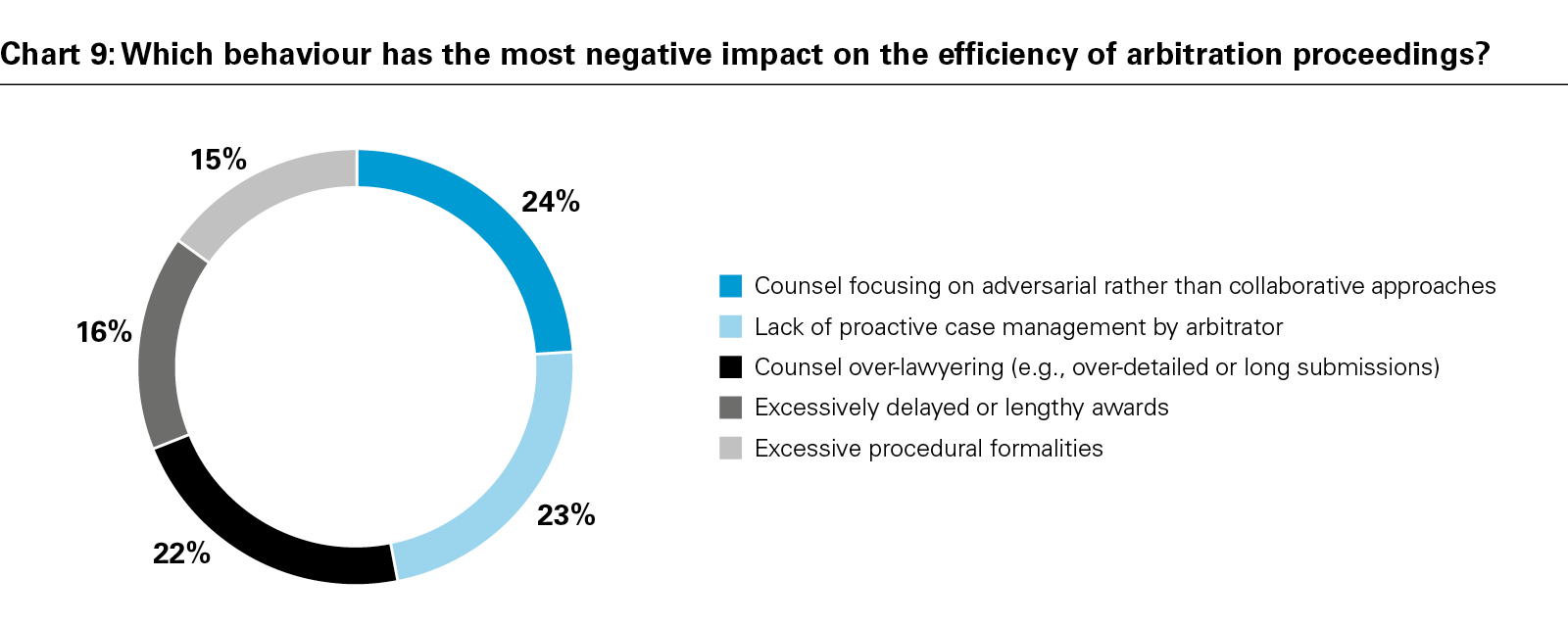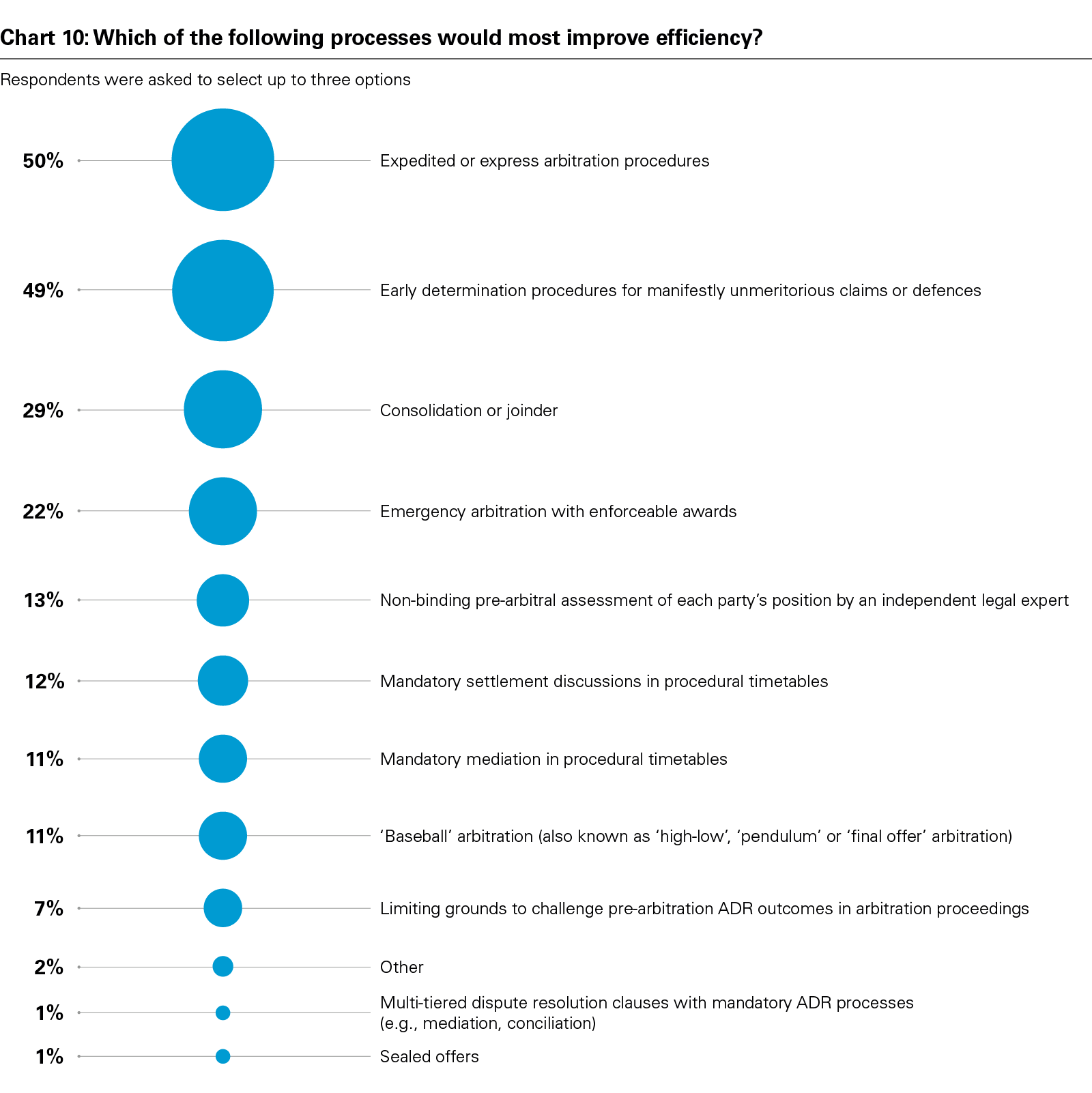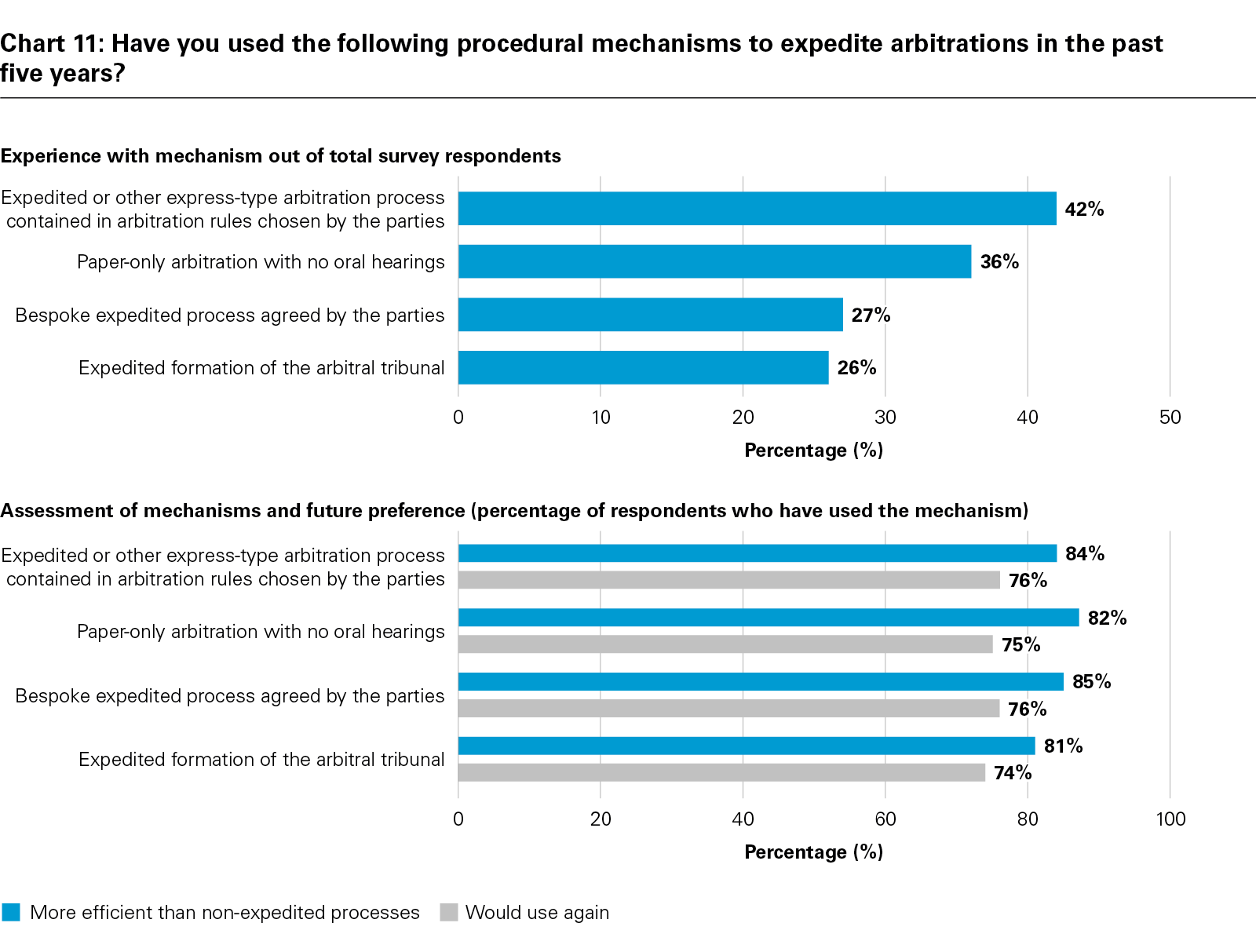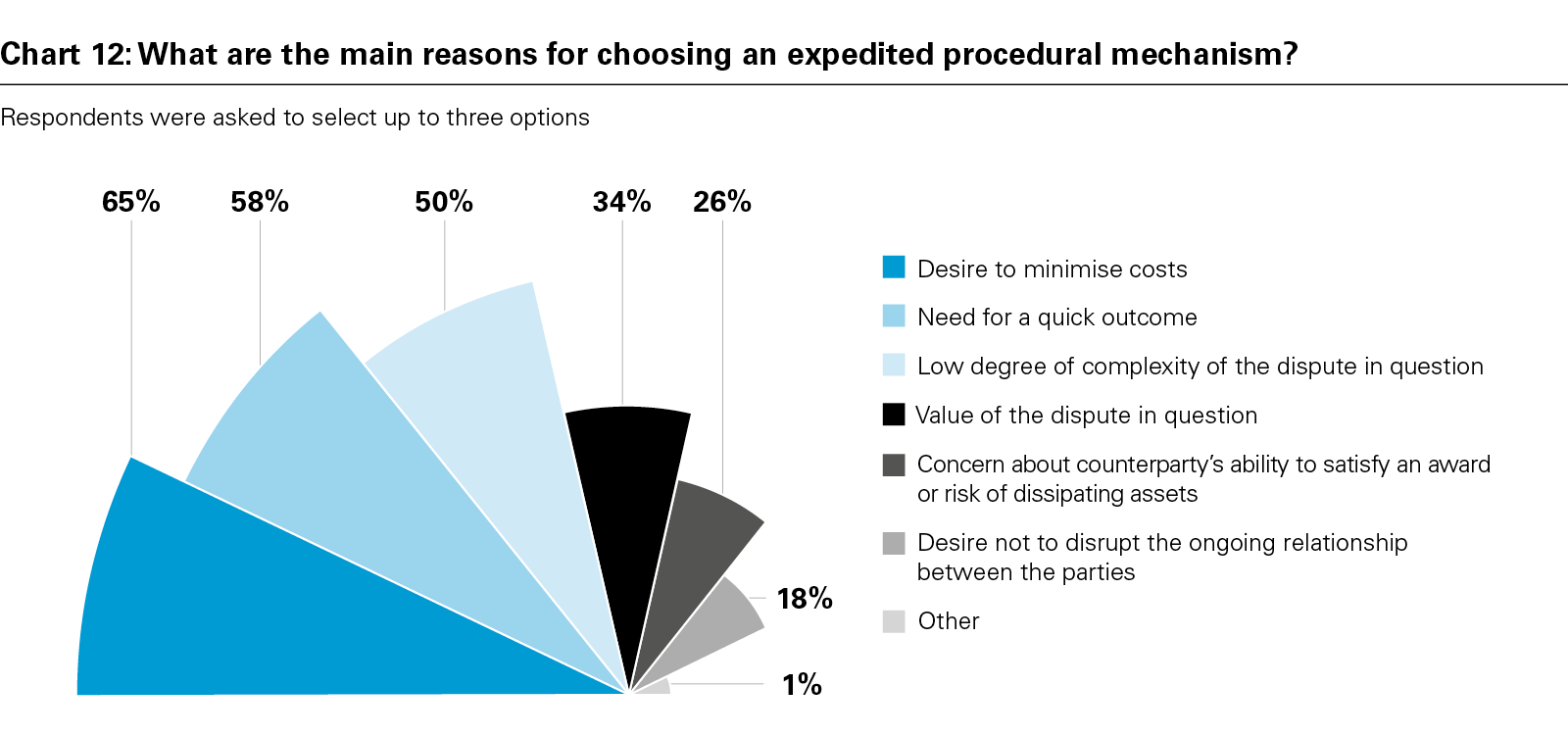Summary
- The behaviours that most negatively impact efficiency in arbitration include adversarial approaches by counsel (24%), lack of proactive case management by arbitrators (23%) and counsel over-lawyering (22%). Respondents called for greater proactivity and courage from both counsel and arbitrators to address inefficiencies.
- The most effective mechanisms for enhancing efficiency were expedited arbitration procedures (50%) and early determination procedures for manifestly unmeritorious claims or defences (49%). While expedited procedures are particularly useful in less complex cases, their success depends on the tribunal’s readiness to make swift decisions.
- Respondents enjoyed excellent experiences with mechanisms for expediting arbitrations, such as expedited arbitration procedures embedded in arbitral rules and paper-only arbitration. Most would be willing to use them again. They also acknowledged the need to balance efficiency with procedural fairness.
- The decision to choose expedited procedural mechanisms is driven by pragmatic concerns, principally the desire to minimise costs (65%) and ensure rapid resolution (58%), particularly for disputes of lower value or complexity
Arbitral inefficiency: Who is to blame?
Arbitration is commonly praised for its flexibility and ability to meet the needs of its users
Arbitration is commonly praised for its flexibility and ability to meet the needs of its users. Yet concerns persist about delays and inefficiencies throughout the arbitral process. Time and cost of the proceedings consistently arise among the most significant drawbacks for users.33 In our 2021 survey, we explored whether respondents would be willing to forgo certain common procedural options if this would lead to swifter and cheaper resolution of their disputes.34 To better understand factors contributing to users' frustrations, this time we sought to explore the perceived impact on efficiency of behaviours exhibited by participants in arbitrations that were criticised by respondents to our previous surveys.35
We asked, 'Which behaviour has the most negative impact on the efficiency of arbitration proceedings?' Respondents could choose one out of five options: 'Counsel focusing on adversarial rather than collaborative approaches'; 'Lack of proactive case management by arbitrators'; 'Counsel over-lawyering (e.g., over-detailed or long submissions)'; 'Excessively delayed or lengthy awards'; or 'Excessive procedural formalities'.
The top three selections were adversarial approaches adopted by counsel (24%), lack of proactive case management by arbitrators (23%), and over-lawyering (22%). Excessively delayed awards (16%) and excessive procedural formalities (15%) were viewed as less significant causes of inefficiencies. In other words, opinion was closely divided as to whether counsel or arbitrator behaviour is primarily to blame: 46% of respondents attribute the most negative inefficiencies to counsel behaviour, while 39% attribute it to arbitrators' lack of proactivity during or after the proceedings. Excessive procedural formalities (15%) could be attributed to either or both sets of actors, but a number of interviewees opined that it mainly stems from the procedural rules and arbitral institution staff.
Curiously, less experienced respondents36 consider procedural formalities and delayed awards to have the most negative impacts on efficiency, with one interviewee criticising arbitration as "rigid, costly and slow". For more experienced or frequent arbitration users,37 however, their concerns shift towards counsel behaviour during the proceedings: they found over-lawyering (28%) and adversarial counsel conduct (27%) to be most responsible for inefficiencies.
 View full image: Chart 9: Which behaviour has the most negative impact on the efficiency of arbitration proceedings? (PDF)
View full image: Chart 9: Which behaviour has the most negative impact on the efficiency of arbitration proceedings? (PDF)
Concerns over adversarial rather than collaborative approaches are most significant for Asia-Pacific and North American respondents. Many interviewees commented negatively on counsel behaviour, including a tendency to produce “often baseless and alternative defences or arguments”, which in turn undermined their credibility and impacted the speed, cost efficiency and effectiveness of the proceedings. Other interviewees noted that adoption of litigation-style approaches, ‘guerilla’ tactics and formalised styles of advocacy were detrimental to the practice of arbitration. A few interviewees, including from North America, expressed particular resentment at what they perceived as an “Americanisation” of international arbitration proceedings, in particular excessive disclosure requests and sometimes "aggressive" adversarial conduct. Many interviewees suggested that clients can feel sidelined by counsel when they should be fully involved in decisions concerning the cost and speed of proceedings. Some suggested it would be good practice for clients to participate in case management conferences.
Adoption of litigation-style approaches, ‘guerilla’ tactics and formalised styles of advocacy were detrimental to the practice of arbitration
Arbitrators (35%) were most critical of over-lawyering. Many interviewees, both arbitrators and counsel, expressed clear frustration with excessive submissions, repetitive second or third rounds of memorials, and post-hearing briefs of questionable utility and purpose. Some drew a direct correlation between the quality of argumentation and the length of submissions, pithily concluding that "less is more". One arbitrator noted that, "Counsel should resist client pressure to overload post-hearing briefs with repetitive arguments." Another advised that, "It is not impossible to distil most cases down to something that is not flabby, repetitive and over-long." A note of caution was, however, struck by a few arbitrator interviewees, who warned that an under-lawyered case is also unhelpful as it may be "dodging the point".
Counsel, on the other hand, were more concerned with arbitrators' lack of proactivity (28%), reflecting their reliance on arbitrators to keep proceedings efficient. A number of counsel, arbitrators and other users opined that arbitrators should be more "decisive and courageous", in particular in reaching procedural decisions.38 Another source of frustration regularly aired during interviews by counsel and other users was that "some arbitrators are too busy to be proactive". Arbitrators taking on too many appointments was considered a primary issue. In-house counsel (both private sector and government) also expressed dissatisfaction over delayed awards (23% for each group), with interviewees confirming a desire for arbitrators to better manage their availability and conduct matters expeditiously.
The overall message from the full pool of respondents is clear: addressing efficiency concerns requires greater courage, both from counsel and from arbitrators.
Express lane to efficiency
We asked respondents to identify the procedural mechanisms they believed would most enhance the efficiency of arbitration proceedings. They were asked to select up to three options from a list or suggest 'other' mechanisms in a free text box.
The most favoured mechanisms were expedited arbitration procedures (50%) and early determination procedures for manifestly unmeritorious claims or defences (49%). By contrast, less commonly seen mechanisms, such as baseball arbitration and sealed offers, saw little support among respondents. One interviewee suggested this may be due to a lack of familiarity rather than a perceived lack of usefulness.
Arbitration institution staff and arbitrators strongly support the use of expedited arbitration procedures. Most interviewees found expedited arbitration procedures and rules (such as those commonly seen in many ad hoc arbitration regimes, rules tailored to particular industries or sectors and, increasingly, institutional arbitration rules) to be particularly useful in less complex cases. Their effectiveness, however, depends on the tribunal's availability and willingness to make courageous and quick decisions. Some believe expedited processes should be used more frequently, while others argue they work best when parties are well-prepared, and client expectations are managed. A few questioned the monetary limit institutions impose to access express arbitration, some suggesting that the level of complexity rather than monetary value of the dispute should be the decisive factor.
Many interviewees agreed that a mechanism for early determination for unmeritorious claims is theoretically appealing but may lead to complex procedural issues in practice. While early determination was viewed as a "useful means to dismissing weak claims" and to streamline proceedings, concerns over due process were significant. A number of interviewees called on supervisory courts to offer robust support by declining to annul awards on the sole grounds that claims were struck out on a summary or early determination basis. Others opined that in complex cases, early or summary disposition is useful only for discrete issues such as jurisdiction or limitation periods. While some interviewees noted that frivolous applications for early determination can amount to abuse of process, many agreed that tribunals could and should act more decisively at an early stage.
Consolidation or joinder (29%) was viewed as particularly beneficial for disputes in sectors prone to multi-party or multi-agreement disputes, supply chains or intricate projects and contractual structures, such as in the construction and maritime industries. In disputes arising from complex infrastructure projects, interviewees noted that consolidating arbitrations reduces the risk of contradictory decisions from different tribunals; as one interviewee put it, when done properly, consolidation is "not just about efficiency, but about understanding responsibilities across multiple parties."

View full image: Chart 10: Which of the following processes would most improve efficiency? (PDF)
Interviewees noted that non-binding pre-arbitral assessment may be very useful in helping avoid a full-blown arbitration or, at least, honing focus on the key issues. One interviewee recounted a positive experience of a mock hearing allowing the parties to assess their positions afresh and prompting them to settle. It was also suggested that non-binding pre-arbitral assessments be conducted by external legal experts, as they offer an objective perspective. Others, however, warned that pre-arbitral assessments may add time and costs without always leading to meaningful discussions or resolutions.
Mandatory mediation is similarly seen as "a step in the right direction" for prompting settlements, allowing parties to assess their opponent's position before full arbitration. Some interviewees, however, doubted the possibility of engaging in meaningful deliberations without disclosing key arguments. As for mandatory settlement discussions within procedural timelines, this mechanism was deemed potentially more effective than waiting for parties to initiate negotiations. A number of interviewees generally favoured arbitrators proactively inviting parties to negotiate during the proceedings.
Perhaps most surprisingly, given respondents' generally favourable view of combining arbitration with ADR,39 the option of multi-tiered dispute resolution clauses with mandatory ADR processes was included by fewer than 1% of respondents as one of their three picks. To some interviewees, ADR adds an unnecessary procedural layer. Others question the utility: "If parties have reached arbitration, it is because they have not found another way to settle their difference".
Excellent experience of expedited arbitration
Respondents were asked about their experience with selected procedural mechanisms for expediting arbitrations, whether they found them more efficient than standard processes, and whether they would use them again.
Expedited or other express-type arbitration procedures embedded in arbitral rules were experienced by more than two-fifths of respondents (42%), with 84% of these respondents finding them more efficient than non-expedited processes and 76% willing to use them again. Paper-only arbitration was also frequently experienced (36%), with 82% of those with experience considering it more efficient and 75% open to future use. Bespoke expedited processes (27%) and expedited tribunal formation (26%) were less frequently encountered but had high perceived efficiency (85% and 81%, respectively) and likelihood of reuse (76% and 74%).
Opinions on paper-only arbitration were largely positive, given the obvious potential for costs savings when no oral hearings take place. Interviewees found the paper-only approach particularly effective for lower value or relatively less complex disputes, particularly where no witness evidence was required: "Why have a hearing? The arbitrators rarely push for it." Successful adoption of paper-only arbitrations requires a high degree of confidence in the tribunal: "If you trust the arbitrators to read everything, it works. Otherwise, a hearing is necessary."
Numerous interviewees within the maritime sector emphasised that it is standard practice within that industry for arbitrations to be conducted without oral hearings. These disputes may not be of lower complexity or monetary value, but specialised and experienced maritime arbitrators are confident in dealing with them on a paper-only basis. The approach taken in maritime, commodities and trade arbitrations, often encapsulated within specialised sets of arbitral rules, provides for cost-efficient and effective resolution. Many interviewees also highlighted the potential for paper-only arbitration in financial, mining and insurance sectors, and for post-M&A disputes, regardless of the monetary value of a claim. But many rejected the suitability of using paper-only arbitration in the construction, infrastructure and energy sectors, while others cautioned that complex disputes involving multiple fact and expert witnesses are more likely to require oral witness testimony and examination at oral hearings. As summarised by one interviewee, "In simple cases, paper arbitration is more efficient, but there's no golden rule. It depends on the case."
The clear trend, overall, is that those who have used expedited arbitration mechanisms widely regard them as effective and are willing to use them again.
 View full image: Chart 11: Have you used the following procedural mechanisms to expedite arbitrations in the past five years? (PDF)
View full image: Chart 11: Have you used the following procedural mechanisms to expedite arbitrations in the past five years? (PDF)
The need for speed
Respondents were asked to identify the primary reasons they had chosen, or would choose, an expedited procedural mechanism. Respondents could choose three out of a list of options or add 'other' options in a free text box.
The most cited reason was the desire to minimise costs (65%), highlighting the financial appeal of expedited mechanisms. Speed of resolution was the second most significant factor (58%). Low complexity (50%) and dispute value (34%) were also key factors, indicating that expedited mechanisms are preferred for more straightforward and lower-value disputes. Counterparty enforcement risks (26%) and the preservation of business relationships (18%) were not deemed to be as important to the decision to expedite proceedings.
Cost minimisation was the dominant reason to adopt an expedited mechanism by most categories of participants, in particular arbitrators and counsel. The general opinion was that expedited arbitration reliably lowers costs, for example where arbitrators or counsel operate on a capped or fixed-fee basis, and where no oral hearing takes place. Interviewees mentioned that parties often refrain from including extensive, or even any, document production phases in expedited arbitration schedules, which also significantly saves costs. For some, expedited arbitration is more about cost efficiency than true speed, particularly when dealing with non-responsive parties. Many emphasised the importance of choosing an arbitrator in these cases who is available, responsive and willing to make decisions quickly.
 View full image: Chart 12: What are the main reasons for choosing an expedited procedural mechanism? (PDF)
View full image: Chart 12: What are the main reasons for choosing an expedited procedural mechanism? (PDF)
Interestingly, in-house counsel ranked the speed of resolution as a crucial factor—as significant as cost efficiency—when deciding to expedite arbitrations (58% for in-house counsel in government and 61% for the private sector). This reflects a commercial drive for quick decision-making. One in-house counsel advised that parties should push for expedited arbitrations to obtain a quicker outcome. Others would be willing to "compensate [arbitrators] for efficiency" if it meant reaching quicker decisions, suggesting a range of options from fee scaling to "bonus and penalty" schemes which would incentivise arbitrators to take on fewer arbitrations, and to prioritise resolving disputes they are hearing rather than their counsel work. As one interviewee noted, "Businesses are not in the business of arbitration—they are in the business of doing business" and reaching a quick decision allows them to "get on with their lives".
Interviewees stressed that preserving ongoing relationships is crucial for parties in long-term commercial partnerships. This includes, for example, the energy sector, where they seek to maintain stability, and sectors where the pool of economic players is more concentrated, such as state-related enterprises. The risks of not being able to collect on awards appears crucial in financial or high-risk sectors (e.g., cryptocurrency, offshore or sanctioned entities), or where the counterparty may dissipate assets.
Overall, expedited arbitration is driven by pragmatic concerns. One interviewee outlined what they saw as the best circumstances in which expedited arbitration is ideal: "Low-complexity disputes, typically under US$10 million, where witness evidence is unnecessary, and hearings add little value."
33 2018 International Arbitration Survey, p.8 (Chart 4); 2015 International Arbitration Survey, p.7 (Chart 3).
34 2021 International Arbitration Survey, p.13 (Chart 9): “If you were a party or counsel, which of the following procedural options would you be willing to do without if this would make your arbitration cheaper or faster?”
35 See 2021 International Arbitration Survey, p.13 (Chart 9); 2018 International Arbitration Survey, p.7 (Chart 3), p.8 (Chart 4); 2015 International Arbitration Survey, p. 6 (Chart 2), p.7 (Chart 3).
36 For these purposes, respondents who have experience of 0-2 arbitrations over the past five years (see p.37, Chart 24).
37 For these purposes, respondents who have experience of 30+ arbitrations over the past five years (see p.37, Chart 24).
38 The desire for arbitrators to adopt proactive case management styles in order to discourage dilatory or inefficient behaviour was also reflected in 2021 International Arbitration Survey, p.12; 2018 International Arbitration Survey, p.27; 2015 International Arbitration Survey, p.10; 2010 International Arbitration Survey, p.25.
39 See above Chart 1.
[View source.]